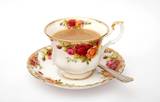tea in brition.jubilee
Launch gallery slideshow

| Group: | cuppa and letter group |
| Swap Coordinator: | reauk (contact) |
| Swap categories: | |
| Number of people in swap: | 6 |
| Location: | International |
| Type: | Type 1: Electronic |
| Rating requirement: | 4.90 (unrated swappers allowed) |
| Last day to signup/drop: | May 31, 2012 |
| Date items must be sent by: | June 7, 2012 |
| Number of swap partners: | 20 |
| Description: | |
|
send list of 5 of your favourite tea s tea in brition. Tea is the British and Irish national drink. Teas in Britain are drunk daily, often many cups a day, but where did this love of teas in Britain come from? History of Teas in Britain and Ireland Tea was first brought to Britain in the early 17th century by the East India Company. It was an expensive product and one only for the rich and often kept under lock and key. Catherine of Braganza, wife of Charles II introduced the ritual of drinking teas to the English Royal Court and the habit was soon adopted by the aristocracy. The first tea shop for ladies was opened by Thomas Twining in 1717 and slowly tea shops began to appear throughout England making the drinking of teas available to everyone. The British further developed their love of teas during the years of the British Empire in India. Which Tea? There are currently almost 1,500 different teas in Britain. They all vary in style, taste and color. Indian Teas India is one of the main growers exporting 12% of the world’s teas. The three main types popular in the UK are: •Darjeeling which comes from Northern India and is a light delicate tea – perfect for Afternoon Teas. •Ceylon Tea is slightly stronger than Darjeeling. It is aromatic with a slightly sharp taste. •Assam is a strong tea which stands up well to being blended. •Other teas found in Britain and Ireland are Darjeeling Orange Pekoe, or Ceylon Broken Orange Pekoe. This tea is not orange in flavor, but describes the size of leaf. China Teas The birthplace of tea China produces 18% of the world’s tea . Two favorite types are: •Lapsang Souchong is perhaps the most famous of china teas, the best coming from the hills in north Fujian. It has a smoky aroma and flavor. •Yunnan is a black tea from the province of Yunnan. The rich, earthy flavor is similar to Assam and makes a great breakfast tea. •There are many other varieties from both India and China and other country’s which include green teas, white teas and aromatics. One Per Person and One for the Pot - Making the Perfect Cup of Tea. Everyone has an opinion on how to make a ‘proper’ cup of tea. The first ingredient must be leaf teas. Not tea bags and certainly not powder. Only black tea is considered real for a cup of tea in Britain. Black tea is the dried and fermented leaves of the tea plant, Camellia sinensis. Step by Step Instructions to the Perfect Cup of Tea•Fill a kettle with fresh water and bring to the boil. •Warm the teapot with a little of the boiled water, swirl it around the pot and discard. •Place 1 tsp of fresh, leaf tea per person plus one for the pot. •Top up the teapot with the boiling water (do not allow the water to go off-the-boil or it will not be hot enough to brew the tea). •Leave to infuse for 3 – 4 minutes, no longer or it will develop a ‘stewed’ flavor. •Pour the tea through a tea-strainer directly into clean – preferably – china teacups. Milk in First or Teas in First? Debate continues about whether to put milk in the cup before pouring or after. Originally milk was always added before the tea to prevent the hot teas from cracking the fine bone china cups. Tea experts agree with this tradition but also state to pour milk into hot tea after it is poured alters the flavor of the tea. The Right Teapot The right teapot for the perfect cuppa is a matter if personal preference either metal (all early teapots were solid silver, ornate vessels) or china. A metal teapot will keep the tea hotter for longer but some feel that china keeps a finer flavor, with no tainting from the metal. | |
Discussion
Leave a Comment
You must be logged in to leave a comment. Click here to log in.
- Info:
- Home
- |
- About
- |
- Forum Rules
- |
- Terms of Use
- |
- Press
- |
- Advertising
- |
- Blog
- |
- Graphics & Stuff
- Help:
- New User Info
- |
- FAQ
- |
- Group Info
- |
- Glossary
- |
- Forums
- |
- |
- Contact Admin

